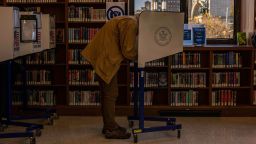A person walks out of a polling site at Brown University hours before the polls close in Providence, Rhode Island, on Tuesday.
(David Goldman/AP)
Whether you’re the most hardened of political junkies or you only tune in?every other November?to vote, it’s always a good idea to brush up on some of the terms you will hear on election night.
What is the balance of power? Political parties have more power when they control the House or Senate by winning a majority of the seats in that chamber. The party in power controls committees that write legislation and decides which measures will get a vote on the floor. In the House, the party with at least 218 seats has the majority and, assuming it can unite behind one candidate, selects the Speaker of the House. In the Senate, the party with 51 votes has the majority.
What is a “flipped seat” or “pickup”? A flipped seat or pickup is one in the House or Senate that voters take from one party and entrust to the other party. Because of?redistricting, nine House seats – including seven new seats where there is no incumbent and two where two incumbents are running against each other – cannot be classified as pickups for either party.
What is an “incumbent?” An incumbent is a lawmaker or elected official running for reelection.
What is a special election? When a senator retires, dies or leaves office before his or her term ends, the state’s governor usually appoints a placeholder to fill the seat. Then there’s often a chance for voters to have their say, usually at the next possible federal election. That’s how Democratic Sens. Mark Kelly of Arizona and Raphael Warnock of Georgia were first elected in 2020 in special elections and why in 2022 both men are running for a full six-year term.
This year, there are special Senate elections in Oklahoma, where Republican Sen. James Inhofe will be resigning next year, and in California, where Democratic Sen. Alex Padilla, who was appointed to replace Vice President Kamala Harris, is running both to fill the remainder of Harris’ term (which ends in January) and to win the next term.
House members cannot be appointed, so when a House seat becomes vacant there needs to be a special election to fill it. This year, there’s a special election in Indiana to serve the last couple months of Rep. Jackie Walorski’s term. Walorski died in August.
What is ranked-choice voting? A number of cities and states are experimenting with ways to give voters more access to the political process and to potentially depolarize politics. Ranked-choice voting is a system in place for most elections in Maine and Alaska where voters rank their choices in order of preference instead of picking a single candidate. If no candidate gets more than 50% of the first-place votes, the bottom candidate is dropped and the second choice of the voters who selected that candidate gets those votes. That process repeats until a winner emerges.
What does “estimated vote” mean? Based on data including turnout in previous elections, pre-election ballots cast or requested, and pre-election polling, organizations can anticipate how many votes are expected in a given election. An estimated vote can under- or overestimate the actual vote, and the percentage reporting may move up or down throughout Election Night depending on how those estimates are adjusted as analysts assess real-time data. As those estimates solidify, they can be useful in predicting how many votes remain to be counted.
What are exit polls? Exit polls are large-scale polls conducted by a consortium of news organizations among early and absentee voters and voters on Election Day. They are conducted as voters leave polling stations, on Election Day and in many states at early voting locations, and also by telephone or online ahead of Election Day to account for mail-in and early voting.
What does “down ballot” mean? The top of the ticket is the race that the largest number of people in a state will see on their ballot. In a presidential year, those candidates are at the top of the ticket. Candidates in more local races are down ballot. A candidate for the House, for example, is down ballot from a presidential candidate. A mayoral candidate is down ballot from a House candidate.
What is a ballot initiative? How does a state decide to put one on the ballot? While most laws are passed by state legislatures or Congress, many states put some questions directly to voters during elections. These can range from issues like marijuana legalization to abortion or tax measures. The ballot initiatives give voters a more active role in choosing the direction of their laws.
What is a CNN “key race”? Who decides that? “Key race” is a subjective term. Most politics watchers generally agree that only a subset of races is truly competitive in November, and these are generally considered the key races. Political parties spend more money on these races. Reporters spend more time covering them.
Of the 35 Senate races on the ballot in 2022, the election forecasters at Inside Elections consider three to be true toss-ups and another four to tilt toward either Republicans or Democrats. Nineteen House races are true toss-ups, although many more could wind up being closely contested. Five governor races are toss-ups. See the Inside Elections ratings for?Senate,?House?and?governor. Key races can also be races that might be less competitive but have broader implications or feature especially notable candidates.

























































































































































































































































































